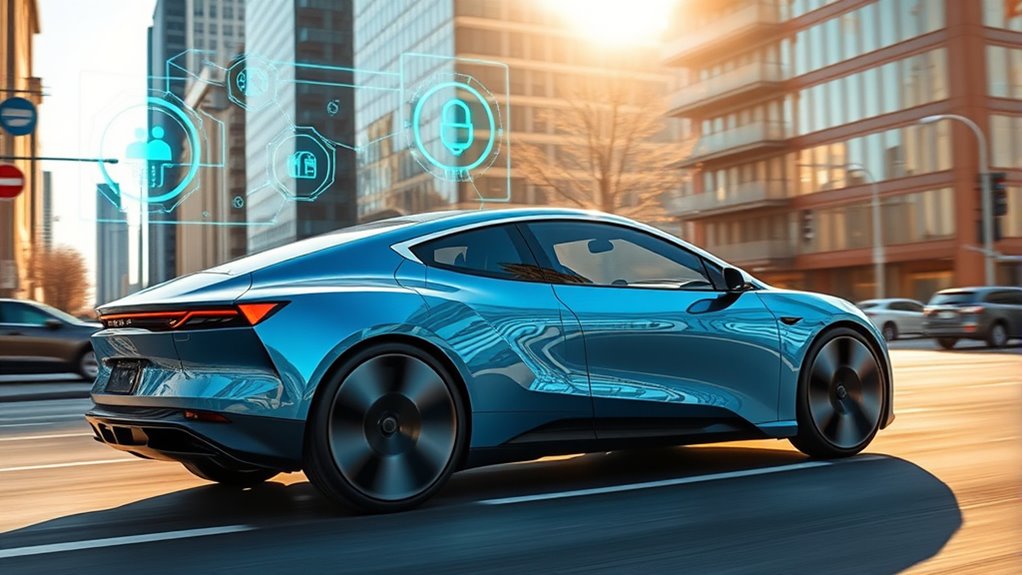Yes, this AI stock could spark the next generation of electric cars by driving innovations in battery tech, autonomous driving, and smart infrastructure. AI’s role in optimizing charging, route planning, and vehicle performance makes electric vehicles more efficient and appealing. Companies leading in AI hardware and software are fueling these advancements, positioning themselves at the forefront of automotive innovation. Stay tuned to discover how these developments could reshape the future of electric mobility.
Key Takeaways
- AI stocks like NVIDIA and AMD are critical for developing advanced EV hardware, enabling faster, more efficient vehicles.
- Investment in AI-driven battery management and autonomous driving tech accelerates the evolution of next-generation EVs.
- AI companies’ innovations in infrastructure and charging optimization enhance EV usability and adoption rates.
- Rising AI hardware demand supports industry growth, fostering breakthroughs that can revolutionize electric vehicle technology.
- The integration of AI into automotive design and infrastructure positions AI stocks to potentially lead the future of electric mobility.

Artificial intelligence and electric vehicles are transforming the tech and automotive landscapes at a rapid pace. As you watch these industries evolve, you’ll notice how AI stocks are becoming key drivers of innovation, attracting significant investments. Companies like Microsoft and Google are reaping the benefits of AI adoption across sectors like healthcare, education, and business automation. Their advancements push the industry forward, encouraging smaller innovators to enter the market with fresh ideas. The demand for AI hardware, such as GPUs and processors, fuels growth for companies like NVIDIA and AMD, making them essential players in this tech revolution. As industries increasingly integrate AI solutions, sector-specific order flows in AI stocks are rising, reflecting confidence in future growth. This trend remains strong in 2025, driven by broader technological and economic shifts that favor continued innovation. As AI hardware demand surges, companies involved in manufacturing these components are experiencing notable growth. Meanwhile, the electric vehicle (EV) market is surging. You see this in the way consumer adoption accelerates, thanks to advancements in tech, expanded charging infrastructure, and government incentives. Battery innovations like solid-state tech and new cell designs enable faster charging, longer range, and better performance—all making EVs more practical and appealing. As automakers compete to offer affordable models across various price points, traditional brands such as BMW, Mercedes-Benz, and Hyundai, along with EV specialists like Tesla and Lucid, are launching new models. Tesla, holding about 44% of the U.S. EV market at the end of 2024, faces rising competition, which only broadens choices for consumers. AI plays a pivotal role in this transformation by optimizing EV charging, helping drivers locate stations, plan routes, and predict maintenance needs. It enhances battery management systems, extending battery life and boosting performance. Autonomous driving features, powered by AI, are becoming more advanced and accessible, making driving safer and more convenient. Real-time traffic data and energy consumption analytics further support smarter EV use, giving manufacturers a competitive edge. Startups like Rivian and Canoo introduce innovative business models and niche vehicles, disrupting the traditional market. Their success hinges on execution, production scale, and real-world performance. Battery improvements, especially solid-state technology, are essential for future EV performance. Rapidly expanding charging networks, supported by investments, make recharging faster and more reliable. The development of renewable energy technologies is crucial for sustainable transportation and reducing emissions.] As AI continues to integrate into EVs and infrastructure, this synergy could spark the next wave of automotive innovation, with AI stocks at the forefront.
Frequently Asked Questions
What Are the Potential Risks of Investing in AI Stocks?
Investing in AI stocks carries significant risks you should consider. You face market concentration risk, as a few companies drive most growth, making your portfolio vulnerable if one stumbles. Volatility is high due to hype and speculative trading, which can lead to sharp price swings. Technological uncertainty and rapid industry changes mean your investment might not pay off long-term. Additionally, smaller firms pose higher innovation and execution risks, making diversification essential.
How Does AI Technology Specifically Improve Electric Vehicle Manufacturing?
AI technology improves electric vehicle manufacturing by automating quality control, reducing defects, and streamlining production with self-regulating assembly lines. It enhances precision through robotics, accelerates design and testing cycles, and predicts equipment failures to minimize downtime. Additionally, AI optimizes energy efficiency during operation, supports innovative material discovery, and improves thermal management, resulting in safer, more reliable, and cost-effective EVs that meet consumer demands faster.
Are There Regulatory Hurdles for Integrating AI Into Electric Cars?
Yes, integrating AI into electric cars faces regulatory hurdles. You need to navigate federal policies like the White House AI Action Plan and the Department of Transportation’s streamlined exemptions for autonomous vehicles. In the EU, strict AI risk classifications and transparency rules add compliance costs. Additionally, state regulations, especially in California, impose further requirements for transparency and safety. These hurdles can delay deployment and increase costs for AI-powered EVs.
What Is the Projected Market Share of Ai-Driven Electric Vehicles?
The projected market share of AI-driven electric vehicles is soaring like a rocket headed for the stars. By 2025, AI-enhanced EVs could make up about 25% of new sales globally, with that figure climbing to over 50% by 2035. As more consumers embrace smarter, more efficient cars, AI integration becomes the engine fueling this rapid growth, transforming the auto industry into a high-speed journey toward a cleaner, electrified future.
How Soon Can Consumers Expect Ai-Enhanced Features in Electric Cars?
You can expect AI-enhanced features in electric cars as early as 2025. Automakers like Volvo, Ford, and Tesla are rolling out Level 3 autonomous driving and smart connectivity tools soon. By then, your vehicle will assist with complex driving tasks, optimize routes, and connect seamlessly with your devices. Expect these intelligent systems to become standard by mid-2020s, making your driving safer, more convenient, and more responsive in urban and highway settings.
Conclusion
As you consider investing in this AI stock, it’s clear that its potential to revolutionize electric cars is significant. With advancements in AI driving innovation, could this be the catalyst that accelerates the next wave of electric vehicle development? While the future remains uncertain, one thing’s certain: staying informed about such technologies could position you ahead of the curve. Are you ready to seize the opportunities that lie at the intersection of AI and electric mobility?











